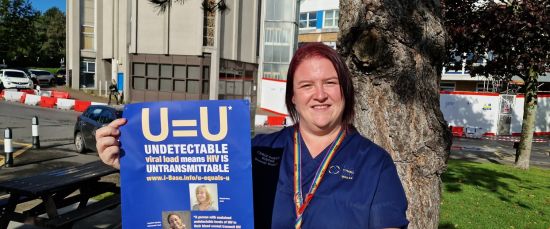HIV – get tested, get peace of mind
 Carly Porter Carly Porter
November 16, 2022
The sooner you get tested for HIV, the sooner your condition can be treated if you prove positive.
That’s the key message from Swansea Bay’s sexual health team ahead of Wales HIV Testing Week (21-27 November 2022).
HIV is a blood-borne virus that you can get through unprotected sex.
Anyone can get HIV if they are having unprotected sex, it isn’t limited to any one sexuality, race, religion or gender.
Although we have come a long way since the sombre AIDS tombstone campaign days of the 1980s - with HIV no longer being viewed as the death sentence it once was - it is vital that the condition is detected as soon as possible.
Sister Carly Porter (pictured above) said: “Back in the 80s we had the AIDS tombstone – it was quite scaremongering. Misinformation and misconceptions play a large role in HIV stigma and can create a barrier to getting tested.
“This Wales HIV Testing Week we’re encouraging people to challenge their understanding of the facts in order to educate and inform them about the support available.”
Modern treatments mean those affected by HIV can go on to lead full, long and healthy lives if they seek the appropriate help and support.
Carly said: “HIV is now seen more as a long-term chronic condition, something along the lines of high blood pressure or diabetes, which you can take treatment for, and it can be well controlled. But you cannot get treated if you do not know your status.
“We do get people who have fears and wonder if they have it or not and we can help put their minds at ease.”
Wales has a higher prevalence of HIV stigma and late HIV diagnoses than much of the UK.
Carly said: “Of the new diagnoses this year, the majority were late diagnoses – they had been sent to hospital because they were poorly and were tested while in hospital.
“We want to prevent the late diagnosis. We want to test them sooner, so they get the diagnosis sooner and be started on treatment sooner.”
Although HIV is more common in men who have sex with men, bisexual men and African communities, there are now more people being infected outside of these groups.
“HIV is an issue for everyone, and the team welcomes all and testing has never been easier to arrange,” said Carly.
“We do advise people to get tested regularly. Every three months is optimum – depending upon new sexual partners.
“There are a few ways of getting tested. You can do it online and a kit is sent to your home address. It’s a finger prick test that you have to use and send back to the service.
“If there are any reactive or positive results then it will come straight to Swansea Bay sexual Health clinic, and they contact the person directly."
Tests can take a week to 10 days to complete, although if someone is deemed very high risk and it can be turned around in a day.
“If you come to the sexual health clinic or use the online service it’s all anonymised,” said Carly. “We would only contact your GP if you were happy for us to do so.”
Treatment has gone through a significant change over the last 20 years.
Carly said: “Once you have received a HIV diagnosis we tend to offer medication or treatment straight away. As long as you’re taking your medication responsibly, the virus level will become undetectable, and you cannot pass it on to other people through sex.
“To reduce the stigma surrounding HIV it is very important to look at education and educating people – living with HIV is controllable. As long as the person is on treatment it’s a condition that we can manage.”
Alongside improved treatment, preventative measures have also come on in leaps and bounds, most notably the use of Pre-exposure prophylaxis (PrEP).
Carly said: “It’s a preventative measure to take prior to sex. There are two different ways of taking it. You can either take it daily or, event based, which is when you take it only when you are going to put yourself at risk.
“We recommend PrEP for anyone who feels they are high risk of HIV, again, PrEP is not limited to a specific gender, anyone can take it. We would perform a full screening, full blood work, and then we will give you a supply of PrEP and follow you up accordingly.
“You have to come to the sexual health service to get it, and while it can be anonymous, we would always encourage our patients to share this information with their GP.”
During HIV testing week Swansea Bay is opening its clinics for people to walk in for testing rather than having to make an appointment.
Monday 21st November 2022 – Clinic B1 in Neath Port Talbot between 4pm and 7pm.
Wednesday 23rd November 2022 – Quarella Road clinic Bridgend between 4pm and 7pm.
Thursday 24th November 2022 – Singleton Hospital Sexual Health Dept between 4pm and 7pm.
Saturday 26th November 2022 – Singleton Hospital Sexual Health Dept between 9am and 1pm.
You can also contact the sexual health clinic for advice on 0300 555 0279, email sbu.sexaulhealth@wales.nhs.uk or book online via www.friskywales.org
Contact:
Paul Lewis
Dirprwy Bennaeth Cyfathrebu Deputy Head of Communications
Bwrdd Iechyd Prifysgol Bae Abertawe Swansea Bay University Health Board
Pencadlys Bae Abertawe Swansea Bay Headquarters, 1 Talbot Gateway, Port Talbot, SA12 7BR.
(01639) 683331. Mobile: 07816 174227
paul.lewis2@wales.nhs.uk
https://bipba.gig.cymru/ https://sbuhb.nhs.wales/
Source: https://sbuhb.nhs.wales/news/swansea-bay-health-news/hiv-get-tested-get-peace-of-mind/
"Reproduced with permission - "Swansea Bay University Health Board "
Swansea Bay University Health Board
For more HIV and AIDS News visit...
Positively Positive - Living with HIV/AIDS:
HIV/AIDS News |